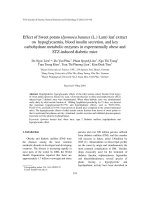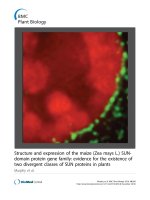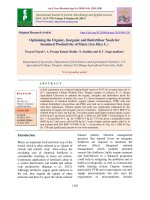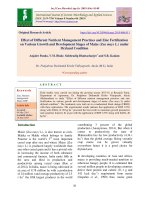Effect of halo priming, osmo priming and hydro priming on fresh and accelerated aged seeds of baby corn (Zea mays L.) on germination, seedling dry weight, seedling length
Bạn đang xem bản rút gọn của tài liệu. Xem và tải ngay bản đầy đủ của tài liệu tại đây (270.33 KB, 6 trang )
Int.J.Curr.Microbiol.App.Sci (2019) 8(5): 1474-1479
International Journal of Current Microbiology and Applied Sciences
ISSN: 2319-7706 Volume 8 Number 05 (2019)
Journal homepage:
Original Research Article
/>
Effect of Halo Priming, Osmo Priming and Hydro Priming on Fresh and
Accelerated Aged Seeds of Baby Corn (Zea mays L.) on Germination,
Seedling Dry Weight, Seedling Length
Akash Bhargaw1*, Akanksha1, Dnyaneshwar Arjun Madane2 and Priyamvada Chauhan2
1
Department of Agronomy, School of Agriculture, 2Department of Agronomy, Lovely
Professional, University, Phagwara, 144411, Punjab, India
*Corresponding author
ABSTRACT
Keywords
Vigour Index,
Priming, Cell
membrane, CaCl2,
KNO3
Article Info
Accepted:
12 April 2019
Available Online:
10 May 2019
This experiment was laid down in Post Graduate Laboratory, Department of Agronomy
Lovely Professional, University, Phagwara, Punjab which is situated at Latitude at 31.253
N and Longitude at 75.703E at the altitude of 240.0 m above the sea level. To check the
effect of halo priming, osmo priming, and hydro priming on the fresh and accelerated aged
baby corn seeds. Different dose of priming solution with different time duration was
tested. T0- Unprimed (control) T 1 Distil Water 12 hours, T2 Distil Water 24 hours, hydro
priming, T3 KNO3 1% 12 hours, T4 KNO3 1% 24 hours, osmo priming, T 5 CaCl2 1% 12
hours, T6 CaCl2 1% 24 hours, halo priming. It was observed that all primed seeds showed
significant difference among each other in both seeds slot (fresh and aged) in term of
germination percent, seedling length, seedling dry weight, and vigour index Ⅰ Ⅱ. It was
observed that seeds treated with hydro priming for 24 hours had showed maximum values
in all the above parameter in both seed slots.
Introduction
Baby corn is a nutritive and delicious product
continuously gaining popularity in big cities
and towns. Because of its sweet and nutritive
values it is highly demanded in hotels and
restaurants. It consist of carbohydrates,
vitamins, proteins, fat and minerals in
sufficient, and in digestible matter. Baby corn
is a rich source of phosphorus (82 mg /100 g
of portion in compare to other common
vegetable only contain 21 to 57 mg of
phosphorus contain) Less calorie, higher fiber
contain, very less cholesterol containing very
little amount of vitamin B and zinc make a
good option for people suffering from heart
disease. Beside its nutritive and test it is also
one of the most free post effect of pest
chemical as it is harvested within 2,4 days of
tassel growth and most important baby corn is
covered up strongly with husk and protected
from harmful pest (Pradeep Kumar et. al.,
2004).
1474
Int.J.Curr.Microbiol.App.Sci (2019) 8(5): 1474-1479
Baby corn has been gaining popularity in
countries like US, EU, China, Japan and south
East Asia. Developing countries like Zambia,
South Africa and Vietnam has also started
their cultivation. Today China and Thailand is
the most producers of baby corn as well as top
in consuming. Besides being domestically
consumed it has also a huge potential of
export. So as a cash crop it can be grown in
India by small farmers to gain income
between two seasons as well as its byproduct
can be also used as fodder crop which can
help in our dairy farming. By huge market
possibility farmers of Meghalaya, western
Uttar Pradesh, Karnataka and Bihar has
started
cultivating
baby
corn
(Ramachandrappa et al., 2004).
further divided into 100 grams of packet total
14 packet were created.
Some Common food recipes made by using
Baby corn
Seed priming method
Baby corn soup with Manchurian.
Baby corn pizza
Moroccan Couscous plate of mixed greens
with Baby Corn
Baby Corn fry with Carrots and
mushroom
Materials and Methods
This experiment was laid down in Post
Graduate
Laboratory,
Department
of
Agronomy, Lovely Professional, University,
Phagwara, Punjab which is situated at
Latitude at 31.253 N and Longitude at
75.703E at the altitude of 240.0 m above the
sea level. To check the effect of halo priming,
osmo priming, and hydro priming on the fresh
and accelerated aged baby corn seeds.
Different dose of priming solution with
different time duration was tested. T0Unprimed (control) T1 Distil Water 12 hours,
T2 Distil Water 24 hours, hydro priming, T3
KNO3 1% 12 hours, T4 KNO3 1% 24 hours,
osmo priming, T5 CaCl2 1% 12 hours, T6
CaCl2 1% 24 hours, halo priming. Total 1.4
kg of baby corn seed were taken each was
Accelerated ageing
The Baby corn seeds were accelerated aged
from (Delouche and Baskin, 1973) method.
For accelerated ageing seed sample were
placed on monolayer wire gauze in a
controlled humidity .Chamber maintained or
adjusted at 40 0C ± 1 0 C and 100 percent
relative humidity. The humidity in chamber
was maintained for 24 hours in all three
replications for analyses. All the observations
on seed quality and biochemical parameters
recorded were the average of three
replications.
For T0 (control) 100 grams of seed were taken
and without any treatment it was stored in air
tight zip bags. For T1 (Hydro priming) 100
grams of seed were soaked in 200 ml of
double distil water in 500 ml of glass beaker
for 12 hours. For T2 (Hydro priming) 100
grams of seed were taken and soaked in 200
ml of double distil water for 24 hours
(Ahammad, 2014). For T3 (osmo priming) for
osmo priming KNO3 was used as a solvent. 1
% of KNO3 solution was prepared. 2 gram of
KNO3 was taken in 200 ml of distil water in a
beaker. Seed of 100 grams was soaked in that
solution for 12 hours. For T4 (osmo priming)
same solution and same seed weight used in
T3 treatment was used but the timing for
soaking of seed was increased for 24 hours
(Kumari et al., 2017 and Soleimanzadeh,
2013). For T5 (Halo priming) for halo priming
CaCl2 was used as solvent. 1% of solution
was to be made. For preparing 1% of solution
2 gram of CaCl2 was taken and 200 ml of
distil water was used. 100 grams of seed was
soaked for 12 hours. For T6 (Halo priming)
same solution and same quantity of seed was
soaked for 24 hrs (Debnath et al., 2017).
1475
Int.J.Curr.Microbiol.App.Sci (2019) 8(5): 1474-1479
Germination test
Stander germination test was conducted by
paper germination test method. Before using
this paper it was to be kept for overnight
soaked in water. Next day on one butter paper
two germination paper well soaked in water is
to be kept. On that paper 100 seeds were kept
in proper rows and Coolum and then it is
covered with one more paper soaked in water.
After this it is covered with butter paper and
is folded in round bundle while folding it
must be kept in mind that seeds position in
paper should not be disturbed. Butter paper is
used here to cover the paper roll by both sides
so that to minimize water loss throw
evaporation. Three replication of each
treatment was maintained. Then this all paper
folds are kept in a tray with 2, 3 inch of water
in tray. And this tray along with paper fold
should be kept in germination chamber.
Temperature of germination chamber should
be kept between 23 ℃ to 27 C but ideal
temperature for baby corn seed germination is
25C. So germination chamber temperature
was kept at 25C for 12 days.
Results and Discussion
Significant variation was observed between
fresh and aged seed slot and within different
treatment of priming which is mention in
table 1.
According to table the mean germination
percent of fresh seed was calculated 73.9 % in
which highest germination percent was
observed in T6 in hydro priming for 24 hours
followed by other hydro primed treatment for
12 hours and lowest germination was
observed in T0 in control. Mean germination
for aged seed was calculated 68.9 % in which
T6 hydro priming for 24 hours followed by
hydro primed treatment 12 hours and lowest
was in T0 Soleimanzadeh (2013).
This difference in germination percent
between fresh and aged seed may be due to
the embryo injury of aged seed and metabolic
slowdown. Second possible reason may be
due to slow mobilization of soluble molecules
of sugar which ultimately delay the
germination process (Mc Donald, 1999 and
Powell et al., 2000).
The mean followed by different letters are
significantly different at p˂ 0.01 according to
tukey LSD for separation of mean
Significant variation was obtained between
the fresh and aged seed slots as well as
difference in value was also obtain within
different type of priming methods as mention
in table 2.
The mean value of fresh seed seedling length
was obtaining 9.11 cm and highest seedling
length was observed in T2 hydro priming 24
hours and lowest length was observed in T0
control. On other hand mean seedling length
for aged seeds was calculated 8.1 cm in which
hydro priming for 24 hours showed maximum
seedling length and minimum was obtain in
control. Present results are justified by
Ahammad (2014).
Better growth in hydro priming could be due
to better absorb of water by seeds which
further help seeds in imbibition process
followed by other steps needed for
germination. Reduce in length in aged seeds
may be due to slow physiological reaction in
cell membrane occurring due to reduce in
soluble sugar molecule. Second possible
reason for reduce in seedling length may be
due to damage in embryo and due to leakage.
Mean seedling dry weight for fresh seed slot
was calculated 151.4 mg in which highest dry
weight was obtain in hydro primed seed for
24 hours and lowest was control. And mean
seedling dry weight in aged seed was
1476
Int.J.Curr.Microbiol.App.Sci (2019) 8(5): 1474-1479
calculated 134.6 mg in which again hydro
primed seeds for 24 hours had showed
maximum results and lowest was obtain in
control Rahman et al., (2014).
Improvement in seedling length can be
partially related to dry matter contain as it is
not compulsory that if long seedling growth
will have more dry weight. But in most of the
case length can effect directly to weight of
seedling. In present study primed methods
had helped the seeds to repair and nourish the
cell membrane, complete first two steps of
seed germination. As from data mention in
table 1 and 2 it is clear that although mean
value of aged seed is less than fresh seed in
germination, seedling length and seedling dry
weight but still some primed aged seeds had
showed better results in compare to control of
fresh seed slot (Hussaini et al., 1988 and
Ramamoorthy et al., 1989).
Table.1 Paper germination test
Treatment
T0
T1
T2
T3
T4
T5
T6
Fresh seed
69.3a ± 2.7
80.0a ± 2.0
81.3a ± 1.4
70.0a± 1.7
72.3a± 0.8
70.0a± 2.0
74.0a± 2.0
Aged Seed
61.0c± 0.5
73.6ab± 0.8
75.0a± 1.4
66.3bc± 1.7
68.0abc± 0.8
68.0abc± 1.0
70.3ab± 1.7
Table.2 Seedling length and seedling weight
seedling length (cm)
seedling dry weight (mg)
Treatment
Fresh seeds
Aged seeds
Fresh seeds
Aged seeds
T0
8.85c± 0.01
7.84b± 0.04
134.3b± 10.7
122.0b± 2.00
T1
9.30a± 0.02
8.25ab± 0.05
159.3a± 4.09
142.6ab± 4.84
T2
9.39a± 0.01
8.48a± 0.22
160.0a± 4.04
143.6a± 1.76
T3
9.03b± 0.02
8.01ab± 0.01
147.0a± 2.30
130.3ab± 4.80
T4
9.12b± 0.01
8.06ab± 0.00
155.3a± 1.33
138.6ab± 4.17
T5
9.04b± 0.01
8.04ab± 0.02
148.6a± 3.71
132.0ab± 4.00
T6
9.08b± 0.00
8.06ab± 0.00
152.6a± 3.92
133.3ab± 1.66
The mean followed by different letters are significantly different at p˂ 0.01 according to tukey LSD for separation of
mean.
From above experiment it can be concluded
that priming technique is effective method to
improve germination percent, promote
dormancy seeds, and improve seedling length
and seedling dry weight mortally priming is
very effective in aged seed as aged seed start
1477
Int.J.Curr.Microbiol.App.Sci (2019) 8(5): 1474-1479
losing its qualitative character after some
time. Among other priming methods like
halo priming and osmo priming hydro
priming for 24 hours had showed better
results in both seed slot.
References
Almeida, I. P. C., Silva, P. S., Negreins, M. Z.
and Barbosa, Z. 2005. Baby corn,
green ear and grain yield of corn
cultivation. Horticultura Brasileira,
Brasilia 23: 960-964.
A.O.A. C. 1984. Official methods of analysis.
14th ed. Association ofofficial
analytical chemists, Arlington, VA,
VSA, p. 415
Balasubramanian, V. and J.E. Hill, 2002.
Direct seeding of rice in Asia:
Emerging issues and strategic research
needs for 21st century. In: Pandey, S.,
M. Mortimer, L. Wade, T.P. Tuong,
K. Lopes and B. Hardy (eds.), Direct
Seeding: Research Strategies and
Opportunities,
pp:
15–39.
International Rice Research Institute
(IRRI), Manila Philippines
Barlow, E.W.R and Haigh, A.M. 1987. Effect
of seed priming on the emergence,
growth and yield of UC 82B tomatoes
in the field. Acta Horticulturae. 200:
153-64.
Bino, R.J., Devries, J.N., Kraak, H.L.,
VanPijlen, J.G 1992. Flow cytometric
determination of nuclear replication
stages in tomato seeds during priming
and germination. Annals of Botany.
69: 231-236.
Black, C. A. 1973. Laboratory methods of soil
investigation and soil fertility.
Department of Agronomy, Iowa State
College, Iowa, U.S.A, 3rd edition
Chandrasenan, N.V. 1996. Effect of
provenance on seed quality and
halogenations treat ment to control the
seed deterioration. M.Sc. (Ag.) Thesis.
Tamil Nadu Agricultural University,
Coimbatore, India
Farahbakhsh H. Germination and seedling
growth in primed and primed seeds of
fennel as affected by reduced water
potential induced by NaCl. Inter
Research Journal of Applied Basic
Sciences. 2012; 3:737-44
Farooq M, Basra SMA, Wahid A. Priming of
field sown rice seed enhances
germination, seedling established,
allometry and yield. Plant Growth
Regulator. 2006; 49:285-294
Farooq M, Basra SMA, Wahid A. Priming of
field sown rice seed enhances
germination, seedling established,
allometry and yield. Plant Growth
Regulator. 2006; 49:285-294.
Gaur, B. L., Mansian, P. R. and Gupta, D. C.
1992. Effect of nitrogen level and their
splits on yield of winter maize (Zea
mays L.). Indian Journal of Agronomy
37: 816-817.
Ghassemi-Golezani K, Aliloo AA, Valizadeh
M, Moghaddam M. Effects of Hydro
and
Osmo-Priming
on
Seed
Germination and Field Emergence of
Lentil (Lens culinaris Medik.). Not
Bot Hort AgrobotCluj. 2008; 36:29-33
Ghassemi-Golezani, K., Chadrdoozjeddi, A.,
Nasrullahzadeh, S and Moghaddam,
M. 2010. Influence of hydro-priming
duration on field performance of pinto
bean (Phaseolus vulgaris L.) cultivars.
African Journal of Agricultural
Research. 5: 893-897.
Ghassemi-Golezani,
K.,
SheikhzadehMosaddegh, P and Valizadeh, M.
2008 b. Effects of hydro-priming
duration and limited irrigation on field
performance of chickpea. Research
Journal of Seed Science. 1: 34-40.
ISTA. 1985. International rules for seed
testing. Seed Science and Technology.
13: 299-355.
ISTA. 1999. International rules for seed
1478
Int.J.Curr.Microbiol.App.Sci (2019) 8(5): 1474-1479
testing. Seed Science and Technology.
27: 25-30.
Jackson, M. L. 1973. Soil chemical analysis.
Prentice Hall of India Private Limited,
New Delhi
Kawatra and Sehgal, 2007. Value added
products of maize. (Quality protein
maize and baby corn). National
Conference on “Double Maize
Production” organized by IFFCO
Foundation, ICAR, DMR, DAC &
IFFCL at New Delhi on May 08-09,
2007.
Kundu, C and Basu, R.N. 1981. Hydrationdehydration treatment of stored carrot
seed for the maintenance of vigour,
viability and productivity. Scientia
Horticulture. 15: 117-125.
Mc Donald, M.B. 2000. Seed priming. In M
.Black, J.D. Bewley (eds.) – Seed
technology and biological basis.
Sheffield Academic Press. pp: 156168.
Meena, O. P. 2000. Effect of nitrogen and
plant population on performance of
maize (Zea mays L.): varieties for
green cob Agronomy, Maharana
Pratap University of Agriculture and
Technology, Udaipur.
Misra, N.M. and D.P. Dwivedi, 1980. Effect
of pre- treatments on growth and
chemical components on sowing seed
treatment on growth and dry matter
faba bean plants under saline
conditions. Annals of accumulation of
high yielding wheat under rain-fed
Agricultural Science, 44: 159-171.
Muntz, K., Belozersky, M.A., Dunaevsky,
Y.E., Schlereth, A and Tiedemann, J.
2001. Stored proteinases and the
initiation
of
storage
protein
mobilization
in
seeds
during
germination and seedling growth.
Journal of Experimental Botany. 52:
1741-1752.
Yarnia M, Tabrizi EFM. Effect of seed
priming with different concentration
of GA3, IAA and Kinetin on
Azarshahr Onion germination and
seedling Growth. Journal of Basic and
Applied Scientific Research. 2012;
2(3):2657-2661.
How to cite this article:
Akash Bhargaw, Akanksha, Dnyaneshwar Arjun Madane and Priyamvada Chauhan. 2019.
Effect of Halo Priming, Osmo Priming and Hydro Priming on Fresh and Accelerated Aged
Seeds of Baby Corn (Zea mays L.) on Germination, Seedling Dry Weight, Seedling Length.
Int.J.Curr.Microbiol.App.Sci. 8(05): 1474-1479. doi: />
1479









